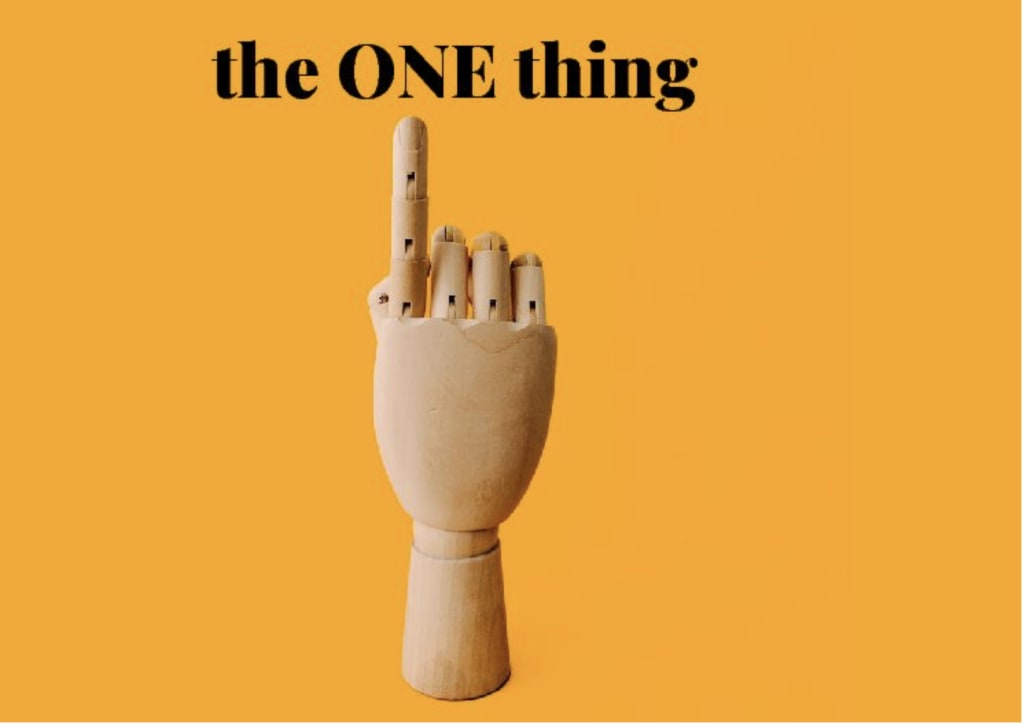A book to help you see what’s important – then do it.
Feeling overwhelmed, lacking focus? Gary Keller's The ONE Thing will help you see what's most important – then get it done

Does this feel familiar?
Lately I’ve been feeling overwhelmed, unfocussed. I was starting a lot of things, finishing none, and the URGENT list on my task manager was so long I couldn’t read it. Life felt like an endless series of open loops, all clamouring for my attention.
I was multi-tasking, fire-fighting, doing lots of busywork that wasn’t really progressing anything important. When I feel like this, I reach for Gary Keller’s book The ONE Thing. It’s the antidote.
It’s a simple idea, built around a powerful question:
What’s the one thing I can do, such that by doing it, everything else will be easier or unnecessary?
When I’m juggling too much or unsure what to do next, I take this question to my morning journal, and play with it for a while. This time, I quickly saw that there were 4-5 projects that could be finished fairly quickly, if I made each of them my main focus, one by one. And that getting them done would take a lot of stress away, and make everything else easier.
Indeed, once I asked what was the ONE thing I needed to do to move each of them forward, I saw that some were simply waiting for me to send something to a collaborator (my book cover designer; my accountant; my tech VA). One involved writing a difficult email I’d been putting off, another needed me to focus on a few training videos to learn a new technical skill. I blocked out time in my schedule every morning and just worked through these, feeling the fog clear as I got each task done.
Then I could focus on the bigger projects.
I have two new book ideas, and one book I started, then put on hold during the pandemic. There are other writing projects. A few exciting business opportunities. And some workshops I’ve been asked to deliver.
Here, I needed to look at the big picture, to think where I wanted to be in the next 5-10 years, and which of these projects were most likely to get me there. Then I thought about our finances, and what I needed to earn over the next three months. Finally, I blocked out an afternoon to map out these projects and plan them with realistic deadlines and milestones along the way. Then I chose which to focus on first.
It’s a question that works for everything.
Keller advises you to use this question on every level, from the big picture to the details. Ask it daily, weekly, monthly, yearly. Ask it right now. And ask it about every area of your life:
- What’s the one thing I can do to be fitter and healthier?
- What’s the one thing I can do to find time to myself?
- What’s the one thing I can do to be a better parent or friend?
- What’s the one thing I can do to deepen my relationship with my partner?
- What’s the one thing I can do to further my career?
- What’s the one thing I can do to increase my net worth/invest more/eliminate my credit card debt?
- What’s the one thing I can do to build an audience for my work?
- What’s the one thing I can do to get more clients?
- What’s the one thing I can do to have more fun?
This is the book’s central idea. It’s worth reading for that question alone, and Keller’s analysis of why it works, and how to apply it. It’s a bit shouty in tone – as books on productivity and success often are – but I like the fact that it urges you to shift your focus from area to area, taking in health and fitness, about family, community building and personal growth as well as the more material measurements of success.
The six lies holding you back
Keller also details six beliefs that get in our way, when doing what we want or need to do. Which of these lead you away from focus and into the fog of distraction and busywork?
1. Everything matters equally
There’s a satisfying buzz that comes from ticking items off our list. It makes us feel productive. But it’s pointless if it’s not moving us forward, if it’s not progressing the projects that are important, or that we really care about. So focus on what really matters to you. And keep asking what really matters most until you only have one thing left. Then do it. This means learning to say no to everything that isn’t your one thing.
2. Multitasking helps us get more done
Instead, it’s a recipe for stress, avoidable mistakes, and poor decisions. Switching from task to task drains your energy and destroys your effectiveness. Work on your one thing, without distractions and you’ll do it faster, more gracefully – and feel far less drained.
3. You need more discipline
Here Keller makes an important distinction. Success, he says, is about doing the right thing, not doing everything right. Instead of relying on discipline (and beating ourselves up when we fail), we need to build habits that support us.
Again, do this one habit at a time. Choose the one new habit that will make the biggest difference, and get it solidly established before you introduce another.
4. Willpower is always on tap
Nope. It’s a limited resource, and it runs out. And it doesn’t return until you to recharge by taking some downtime. So eat that frog: do what matters most as early in the day as possible.
5. We all need a balanced life
This is an interesting one. We talk about work/life balance as if we should always be perfectly poised in the middle. But very few big and worthwhile projects work that way. There’s nearly always a point when you have to go all-in. If you focus on all things equally, nothing gets your full attention.
Keller suggests thinking instead about something more like a seesaw than perfectly balanced scales. You stay connected with everything that matters to you, and make sure that you never stay focussed on just one of them for long. They’re all important, and all give your life meaning and purpose.
But when you are focussed on your one thing, you do it completely. So when you’re playing with your children, you’re not also checking your emails. When you’re out on a run, you’re not also taking phone calls. And when you’re doing your creative work, you’re not also paying bills, surfing the net or allowing other distractions.
6. Big is bad
Keller advocates doubling up on your goals, aiming higher – and freeing your imagination to come up with bigger, better, bolder solutions and actions. If you’re looking at a bigger picture, it can help clarify what your next one thing really is. If your aim is to have a series of novels out in the world, to tour your music round stadiums, or a show a major body of work in a gallery, is getting your in-box to zero really so important?
***
Sheryl Garratt is a writer and a coach helping creatives to get the success they want, making work they love. Are you ready to grow your creative business or career? If so, I have a free 10-day course that will help you start strong. Or give you some new ways of thinking if you’re more established. Get it here.
About the Creator
Sheryl Garratt
Sheryl Garratt is a former editor of The Face and Observer magazines, and has written professionally for more than 30 years. She is also a coach working with creatives of all kinds. Find her at thecreativelife.net






Comments
There are no comments for this story
Be the first to respond and start the conversation.